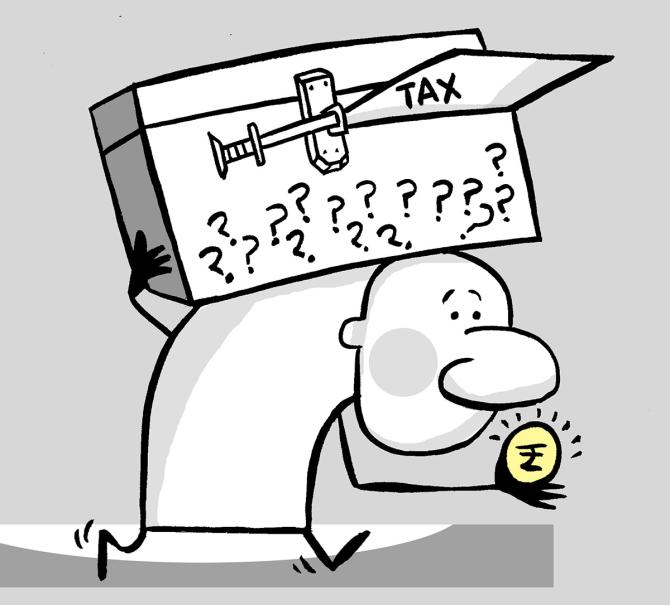'Can I offset the gain on debt mutual funds by the loss incurred on the gifted shares?'

Anil Rego, CEO, Right Horizons, answers your personal income tax queries.
Anoop Dixit: I am an individual taxpayer and have been serving in government organization. Last year I took study leave for 2 -year PG programme from my employer.
My study leave was approved with a bond amount equal to my salary in this period as per “CENTRAL CIVIL SERVICES (LEAVE) RULES, 1972, Chapter VI - Study Leave” and accordingly, I have been providing salary during my study leave and I have been bearing the academic fees of the higher study.
Since I am getting salary from my employer therefore, I am paying income tax as per my slab.
I want to ask you a question that if I get better opportunity in different organization after completion of my PG course and I break the bond and deposit the amount equal to 2 year salary, Will I get back my income tax amount which I paid on my salary during 2 years PG course?
Practically, when I break the bond, I have to refund my total salary amount and when I have not earned single penny during this period so why should I pay income tax?
Kindly shed some light and guide how I can save my income tax proactively if there is no provision in after submitting the ITR.
If you need more details I am happy to share.
Anil Rego: You cannot claim a refund of the total salary amount received in the past nor can you claim a deduction for the amount you have paid. Hence, there is nothing you can do proactively for the same.
Madan Lal: May i request your views on the following:
I have one demat account in my name only and another joint account with my wife where my wife is the first holder. However, the finance for all transactions of joint account is from my pension income. I need to know if i can club the dividend and short as well as long term capital gains/losses from joint account to corresponding figures from my account and declare them in my IT returns.
Anil Rego: It appears that this income has not arisen out of the technical or professional qualifications of your spouse and hence you need to club with your income, the dividend and capital gains/losses that has arisen from your wife’s joint account.
Manpreet Singh Sabharwal: I have a query regarding the PF account. It is more than 15 years working with the same company and PF has never been withdrawn.
I have invested 600+ K INR last year as VPF.
Currently I have the below amount in my PF
PF Balance Company: 800+ K
PF Balance Member: 2040 K
I am about to relocate to Ericsson Saudi in 2 months and will work as permanent employee of Ericsson KSA
Query 1: After relocation, for how much time will I be able to continue earning Interest?
Anil Rego: Your EPF account is eligible to get interest even if there is no fresh contribution till the retirement age of 58. In case of retirement or your exit from the company from where PF corpus is not withdrawn, post 36 months, the account becomes inoperative and no interest is paid. The interest earned during this period (36 months) is taxable in your hands. You can choose a course of action that you would like to use.
Query 2: What is your suggestion for me to manage my PF account?
Query 3: Would I be able to withdraw the complete PF amount? If yes, when would be the ideal time?
Anil Rego: Since you are relocating to Saudi, it maybe a good idea to redeem the funds in your EPF. Complete withdrawal is allowed if one retires or are unemployed for more than 2 months.
Partial EPF withdrawal is allowed under certain circumstances including medical purposes, marriage, home loan repayment, etc.
Chandran KM: I am a regular Tax Payer. On a Capital Gains problem, your advice is sought.
I am holding 500 shares of SBI (example only) since five years (Long Term). I added 100 shares of SBI recently to my holdings (Short Term) but want to sell the last 100 shares: possible reasons -- high loss on the last buy, want to book STC Loss which I can balance with my STC Gain current year itself etc.
How does one selectively sell the 100 Short Term shares only? Just selling the 100 shares and declaring it under Short Term category will do?
Anil Rego: If both the shares are traded from single Demat account, First-in-First-Out (FIFO) method is applied. However, if by chance you changed your trading account and the last 100 shares are in a different demat, then you can sell these shares first to claim a short term loss for the 100 shares as desired by you. Otherwise, it will be on the FIFO principle and there is nothing that you can do to selectively sell the 100 shares that are short term.
Deepika Mehta: My mother (tax payer) got bedridden with critical illness in Feb 2019. I gave up my outstation based occupation in April-19 to revive her but unfortunately lost her on 4th Mar-20, before lockdown. I have following queries about her returns filling and claiming the refunds of TDS done, pre-demise, post-demise and from April-20 onwards.
1] I filed her return post her demise by doing formalities of Legal Representative.
2] I was not aware that the return has to be filed for two periods (April-19 to 4th Mar and 5th Mar to 31st Mar 2020), former being the pre-demise and later post-demise.
3] Her bank could only provide the breakup of interest certificate reflecting TDS after I filed the complete return (till 31st Mar 2020) and could understand that for former part (pre-demise), I actually paid more, for which the bank officer suggested to file revised return and get refund.
Please guide as how (whether) can I file the revise return to claim the refund and also suggest as how should I file post-demise return (5th Mar-31st Mar 2020), as a legal representative.
4] Due to lockdown and her Bank's amalgamation process, the death claim procedure has been delayed (yet to start). This has resulted in TDS on her deposits from 1st April 2020 onwards. Please guide as how should that TDS (FY2020-21, AY2021-22] can be claimed as refund as a legal representative. I have read that as a legal representative, I can only file one year (demise year) return and for filing further I have to get her Estate PAN and get it connected to her existing PAN (by filing as representative). However I am not clear about this process and would request your good self to guide me as currently being without job since April-19, every penny counts. Your guidance will definitely help in getting the refund (if applicable) and lessen the financial crunch.
Anil Rego: On the demise of a person, the legal heir has to file tax returns on behalf of the deceased, to report the income earned by the deceased until the date of her/his death, and taxes deducted thereon. Legal heir needs to register oneself on the income tax website for filing the return on behalf of decease. This is mandatory for e-filing of return on behalf of the deceased person.
The PAN of both the deceased person and legal heir should be registered in the e-filing portal.
Once the request for registration as legal heir is approved, then the person can file return as legal heir on behalf of deceased. So this process seems to have been done by you.
Any income earned after the date of death from the assets inherited from the deceased is taxable in the hands of the legal heir. This would mean that in the year that the person died, the income for the year would need to be segregated between the return of the deceased and the legal heir. Legal heir should include this income inherited from the deceased in his own income while filing own income tax return.
Please do transmission of the deposits/investments in your name (and also other legal heirs, if any). If there is any difference from what is captured here, you can file a revised return.
Somu Balakumar: My gross total income for the year 2021-2022 is 18,68,578.
As per old regime, the total tax amount is INR 290902 and as per new regime is INR 300750. My investments are :
PF – 4 Lakhs
Housing loan = 3 Lakhs
NPS – 1.2 Lakhs
Medical insurance = 28,000
Rent paid per month = 8300
Finally I end up in paying INR 24K in old regime and 25K in new regime.
Can you please advise which one I should take – Old or New ?
I would prefer to go for new as there is no declarations are required and no documents needs to be provided.
Anil Rego: As you have already mentioned one benefits from following the old regime, with lower taxes. However, the option is with you and if you do not wish to go through the documentation/declaration efforts demanded by the old regime then you can take a decision based on your comfort.
Kachhal Prabhakar: Good morning! I retired from govt service on 31.3.2021. My birthdate is 3.3.1961. My sources of income for FY 20-21 is salary and bank interest only. I stay in rented accommodation in East Delhi at present. May please indicate my IT return for FY 2020-21 should be filed by me as a senior citizen?
Anil Rego: You can file ITR Form 1 as your income form supports Salary/Pension, other sources and house property income.
And what type of concessions can I claim?
Anil Rego: Retired employees who are also Senior Citizens between 60 and 80 years of age, the basic exemption limit is fixed at a higher figure of Rs. 3 lakhs. The pension received by you is taxable under the Income head ‘Salaries’ beyond the exemption limit.
Other Benefits:
A retired employee above 60 years of age who is in receipt of pension income from his former employer can claim a deduction up to Rs. 50,000/- against such salary income.
Further you can claim various deductions available under section 80.
Could you please indicate the tax slab applicable for FY2020-21
Anil Rego: Depending on the deductions that you can claim, you can choose between old and new tax regime. It’s beneficial for you to adopt new tax regime if you do not have other housing loans or deductions to claim under Section 80 series. Since you have not mentioned your income level, I have captured the slabs below:

Old regime tax slabs, where you claim various deductions:

Ratish: I have seen your article in Rediff.com Tax Guru. I would like to ask for one clarification. The details are as follows:
During the faceless assessment, AO has issued show-cause notice (draft Assessment Order) proposed to make addition @ 0.50% of GP for non-production of quantitative details. After producing the quantitative details, AO has made addition @ 1% by saying that daily stock register not produced and the stock book contains negative stock on two occasions.
Sir, my query is: can AO do so without issuing the show cause notice for making addition from 0.50% to 1%. Please clarify?
Anil Rego: We don’t have all the details of the matter and do not have an understanding the strength of your case. Hence, we suggest you take the opinion of a tax consultant who is well versed with responding to such matters.
Sunil Wagh: Understand you help to answer queries, saw your post online. Can you pl help me for following: My Job got discontinued in Jul 2020 & my PF contribution was in Aug 2020. Now since then my PF is idle, i am not having new job. But due to my VPF high contribution my PF corpus is substantial. Would like to know till when I can continue to keep my PF & earn interest.
Anil Rego: Your EPF account is eligible to get interest even if there is no fresh contribution till the retirement age of 58. In case of retirement or your exit from the company from where PF corpus is not withdrawn, post 36 months, the account becomes inoperative and no interest is paid. The interest earned during this period (36 months) is taxable in your hands. You can choose a course of action that you would like to use.
Complete withdrawal is allowed if one retires or is unemployed for more than 2 months. Partial EPF withdrawal is allowed under certain circumstances including medical purposes, marriage, home loan repayment, etc. Thus, you may also look to avail partial withdrawal for any of these requirements.
Will I get Tax Free interest for 3 Yrs from Aug 2020 or till age of 55? Pl do let me know.
Anil Rego: Interest earned on the PF account post employment is taxable.
Clarence Fernandes: I have the following query and would be highly obliged if you can let me know:
For FY 2021 22, I have got long term capital gains on debt mutual funds with indexation.
My spouse has gifted some shares to me the previous year and the same was transferred to me in my demat account (shares held by her for long term for 4 years). Overall, if I sell the shares this financial year, I will incur a loss .
Can I offset the gain on debt mutual funds by the loss incurred on the gifted shares?
Anil Rego: Gifted shares would be taxed in your hands as per the taxation of the original purchase. Hence, the capital gains/loss would be in your account as if you have purchased it. It may be noted that long term capital loss cannot be set off against short term capital gains, but only with long term capital gains.
Also kindly let me know if that the original date of purchase by my spouse will be the date on which my spouse purchased the shares?
Anil Rego: Yes, date of purchase will be the date on which your spouse acquired the shares.
Do you have any personal income tax query? Please mail us at getahead@rediff.co.in with the subject line 'Ask Anil' and Anil Rego will answer all your tax queries.
Anil Rego is the founder and CEO of Right Horizons, an investment advisory and wealth management firm that focuses on providing financial solutions that are specific to customer needs.
You can find more of Mr Rego's answers here.











 © 2025
© 2025